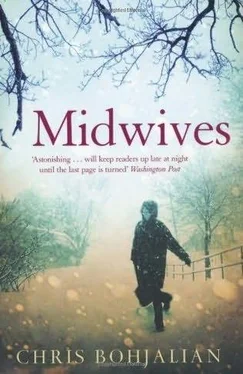Chris Bohjalian - Midwives
Здесь есть возможность читать онлайн «Chris Bohjalian - Midwives» весь текст электронной книги совершенно бесплатно (целиком полную версию без сокращений). В некоторых случаях можно слушать аудио, скачать через торрент в формате fb2 и присутствует краткое содержание. Жанр: Современная проза, на английском языке. Описание произведения, (предисловие) а так же отзывы посетителей доступны на портале библиотеки ЛибКат.
- Название:Midwives
- Автор:
- Жанр:
- Год:неизвестен
- ISBN:нет данных
- Рейтинг книги:5 / 5. Голосов: 1
-
Избранное:Добавить в избранное
- Отзывы:
-
Ваша оценка:
- 100
- 1
- 2
- 3
- 4
- 5
Midwives: краткое содержание, описание и аннотация
Предлагаем к чтению аннотацию, описание, краткое содержание или предисловие (зависит от того, что написал сам автор книги «Midwives»). Если вы не нашли необходимую информацию о книге — напишите в комментариях, мы постараемся отыскать её.
Midwives — читать онлайн бесплатно полную книгу (весь текст) целиком
Ниже представлен текст книги, разбитый по страницам. Система сохранения места последней прочитанной страницы, позволяет с удобством читать онлайн бесплатно книгу «Midwives», без необходимости каждый раз заново искать на чём Вы остановились. Поставьте закладку, и сможете в любой момент перейти на страницу, на которой закончили чтение.
Интервал:
Закладка:
The second group, I'm sorry to say, was considerably smaller than the first. I spent most of that calendar year under the critical gaze of assistant gym teachers, town clerks, checkout ladies at the supermarket, the fellows who pumped gas, and-all too often-the parents of the girls I thought were my friends, or the parents of the children for whom I baby-sat. I could never prove this, but I believe in my heart that Mrs. Poultney abruptly stopped calling me to take care of Jessica the last week of March because of the role she believed my mother had played in another woman's death.
Tom Corts, however, never wavered, and so some afternoons I daydreamed of him tucking me in at the end of the day, or sitting in the rocker beside my bed through the night as I slept. In hindsight those daydreams have led me to wonder on occasion if they were part of some peculiar attempt to forestall an adult sexual relationship with Tom, but most of the time I know that isn't the case. That summer we went well beyond the enthusiastic groping through sweatshirts and cardigans that had marked our spring, but Tom wasn't pressuring me to sleep with him and I was feeling no particular urgency either.
I think instead I daydreamed of Tom watching over me in a vaguely fatherly capacity because I could no longer be protected that way by my own father. Just as Tom had turned sixteen that summer, I had turned fourteen, and that meant I could no longer be held and embraced and cuddled by my dad in the way I once was. I would have used the word weird at fourteen to describe any such desire on my part or show of affection on his, well aware that the word was imprecise. But precision with the language of need is impossible at fourteen, and I feared anything I might say would be misconstrued-or, worse, would reflect a deviance inside me that was at once dangerous and unhealthy.
The fact is, despite the anger that coursed through my father at those moments when he viewed himself as abandoned by his spouse, the midwife, it was indeed my father who taught me how to tease a troll's neon-pink hair. It was my father who was there the Saturday I slid headfirst down a metal slide onto a tent stake and needed seventeen stitches along my cheek. It was upon my father's lap that I watched hours and hours of Sesame Street on a TV with fuzzy reception. My father was of a generation that had yet to understand the profound importance of the frequent squeeze, but he still knelt to hold me relatively often, and I can remember being lifted as a tiny girl into his arms and being hugged. To this day I do not mind at all being held by a man with some stubble on his cheeks.
For Tom's sixteenth birthday, I used up weeks of baby-sitting money to buy tickets to a rock concert in Burlington. Soon after his birthday we went, just the two of us for a change, and we had hours together alone going and returning in a giant Catalina of a car. I turned up the volume on the eight-track tape player that dangled underneath the glove compartment, and curled my legs up against my chest. The Catalina had a couch the size of the general store's freezer case, but Tom was near and the music was loud, and the trip to and from Burlington inside that car offered the sort of vaguely womblike escape I was craving.
Since we happened to be going to Burlington, my mother asked us to drop off an envelope with Stephen Hastings and pick up a banker's box of her files. Stephen had had the files for months, and had photocopied the materials he needed.
My mother probably expected me to peek inside the envelope, and I didn't let her down. She was returning to Stephen Xeroxes of Charlotte Bedford's medical files, part of the history Stephen had petitioned the court that summer to see. My mother had scribbled her thoughts in blue pen on some of the documents, and now that I'm a physician and the trial has passed, the things she circled make sense. In the car that afternoon, however, the notion that Charlotte had been treated five years earlier for iron-deficiency anemia meant little, as did a Mobile, Alabama, doctor's prescription in 1973 for a drug I could not even begin to pronounce at the time: hydrochlorothiazide, an inexpensive diuretic used to control hypertension.
Apparently my mother had treated Charlotte for anemia while the woman was in her care, but not for high blood pressure; apparently Charlotte's blood pressure had not been high enough to alarm her. But, then, it also didn't appear that Charlotte had thought to share with my mother the fact that she'd been treated for the disorder in the past.
Stephen's law firm comprised two Victorian homes that shared a driveway at the edge of the campus of the University of Vermont. The buildings were in the hill section of Burlington, the mannered, elegant, and tree-lined streets at the top of the hill that towered over the commercial section of the city. In the nineteenth century, when Burlington was a thriving Lake Champlain lumber and potash port, the wealthier merchants and more successful businessmen had built homes for their families on the hill above the city proper.
I hadn't expected to see Stephen when we arrived. I had assumed I would simply drop off the envelope with a receptionist, pick up the banker's box, and leave. But after I explained to the woman at the front desk who I was, she said Stephen would be disappointed if he didn't get a chance to come out and say hello. She said he was in the middle of a meeting with an investigator, but the meeting had been going on all afternoon. When she went upstairs to find him, I went back out to the car to get Tom so he wouldn't have to sit there alone, baking in the sun while wondering where I was.
Stephen had been meeting with Patty Dunlevy, and the two of them came out to greet me, Stephen in a crisp navy-blue business suit, Patty in sandals and the sort of flouncy peasant dress I usually associated with my mother's midwife friends. It seemed odd for the woman I'd first met in mirrored sunglasses and a black bomber jacket to be wearing a styleless muumuu, and I must have stared. She took my elbow conspiratorially with one arm and, motioning toward her dress with the other, said, "Isn't this thing hideous? I bought it at a secondhand shop in the North End. But I spent the morning with some more of your mom's moms, and I figured I should look the part."
"The part?" I asked.
"You know, a home-birthy sort. Peace, love, tie-dye. Alternative medicine. Let's barter since I'm broke. I can't pay you, but my husband's a carpenter who will build you the most amazing bookshelves you've ever seen if you deliver my baby."
She talked fast, and her voice was filled with pleasure.
"You should have been an actress," Tom said.
"Brother, I am."
Stephen gave us a tour of the building we were in, and there were moments when I expected to find velvet ropes cordoning off some of the shining hundred-year-old tables and wooden break-fronts that served now to store files: I expected to be told, "George Washington sat here," or "Ethan Allen ate there." The couches were elegant but plush: I could have slept comfortably on any one of them. The chairs behind all of the desks were leather; all of the pens on the blotters were silver or gold. Computers were uncommon then, but they nevertheless seemed to be everywhere.
Finally we passed the conference area in which Patty and Stephen had been working. I don't believe he had intended to show us in, but I didn't realize that at the time; the two adults were a step behind us, and in my awkward fourteen-year-old sort of way I blundered into the dark paneled room, with Tom right beside me. Lit by a chandelier with grapefruit-sized globes, the area looked as if it had once been two separate bedrooms. There was a long, wide table in the center of the room, buried leagues below piles of yellow legal pads, file boxes, and newspaper clippings. The walls were covered with white poster paper on which Stephen and Patty had scribbled notes and names in Magic Marker. There must have been two or three dozen pieces of that paper hung on the walls with thick strips of masking tape.
Читать дальшеИнтервал:
Закладка:
Похожие книги на «Midwives»
Представляем Вашему вниманию похожие книги на «Midwives» списком для выбора. Мы отобрали схожую по названию и смыслу литературу в надежде предоставить читателям больше вариантов отыскать новые, интересные, ещё непрочитанные произведения.
Обсуждение, отзывы о книге «Midwives» и просто собственные мнения читателей. Оставьте ваши комментарии, напишите, что Вы думаете о произведении, его смысле или главных героях. Укажите что конкретно понравилось, а что нет, и почему Вы так считаете.











